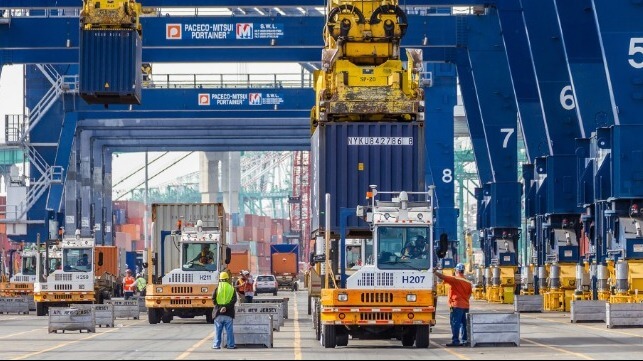Congressional Actions Target Labor, Automation, and Software in Ports

Proposed legislation in the U.S. Congress continues to target key parts of the operations of U.S. ports in the name of protecting and strengthening the U.S. and global supply chain. Bill sponsors site the disruptions during the pandemic as well as the recent West Coast longshore labor issues as well as a contention that China is increasingly gaining a competitive advantage in the ports and supply chain.
Among the range of initiatives aimed at further reforming the Ocean Shipping Act and the powers of the Federal Maritime Commission, two proposals were advanced this week specifically targeting elements of the U.S. ports. One seeks to address labor issues similar to the recent “no show” situation that occurred in the West Coast ports during the final phases of the contract for the International Longshore and Warehouse Union as well as union efforts to stop modernization or servicing uncrewed vessels. The other targets Chinese-made logistics software that the sponsors contend is becoming increasingly prevalent in U.S. and global ports.
Republican Senator James Risch of Idaho joined by three of his Republican colleagues in the U.S. Senate, Mike Crapo (Idaho), Ted Budd (North Carolina), and Rick Scott (Florida), on Thursday, June 22 introduced a piece of legislation that seeks to amend the National Labor Relations Act and the Labor Management Relations Act to “deter labor slowdowns and prohibit labor organizations from blocking modernization efforts,” at U.S. ports. If adopted, the bill calls for financial penalties for any unauthorized labor actions that impact the supply chain.
The bill’s sponsors highlighted slowdown when workers deliberately reduce productivity while pocketing normal pay and benefits amid negotiations to gain leverage over the employer. Citing the use of this tactic during the recent negotiations, they said, “When maritime workers use this tactic, it is not only unfair to the employer, but often causes substantial losses for local businesses importing and exporting goods.”
Contained within the draft bill is a second provision that also prohibits actions to “impede modernization efforts at a port which would interfere with economic activities. It also would prohibit actions to “interfere with or impede the servicing of any automated vessel operating without crew.”
They are citing the importance of ports and their role in growing international trade saying that ports are an increasingly important part of transportation networks. The penalties call for damages “in an amount equal to two times the amount of damages. They cite as an example $50 million in losses to Idaho’s potato industry in 2015 during a previous labor slowdown on the West Coast docks. During the recent labor issues on the West Coast, the U.S. Chamber of Commerce cited cost estimates of the Bush Administration in 2002 saying a serious work stoppage at the ports of Los Angeles and Long Beach would likely cost the U.S. economy nearly half a billion dollars a day – and a more widespread strike along the West Coast could cost approximately $1 billion per day, with the bill proposing that the unions would be liable for twice those amounts.
The second bill was accepted this week by the House Armed Services Committee and presented as an amendment to the 2024 National Defense Authorization Act. As written, it says the purpose is countering the spread of logistics software, specifically barring the Department of Defense from working with entities using the barred logistics software. Port authorities accepting federal grant money would be barred from using the logistics software while the Department of Defense working with the Department of Transportation would have to implement the efforts and report to Congress.
The sponsors of the amendment specifically cite LOGINK, a logistics platform that they report is used at more than 20 ports worldwide. They contend that it “stores unrivaled data and visibility into global shipping container flows. They estimate that China and the LOGINK shipping platform, which they argue is state-controlled, have contact with at least half of the global shipping container flows.
“If LOGINK gained access to U.S. carriers and ports, China would be at an extreme competitive advantage, allowing them to underbid foreign competitors and further increase dependency on Chinese markets,” said Representative Dusty Johnson, a Republican from South Dakota who advocated for the amendment.

that matters most
Get the latest maritime news delivered to your inbox daily.
The issue of Chinese-made logistics software is also linked to the contention that Chinese-made large container cargo cranes are jeopardizing U.S. port operations. Johnson and some of his colleagues either this year introduced legislation aimed at stopping ports from buying Chinese-made cranes and software. Trade groups representing the ports have widely dismissed the claims saying that the cranes do not store information on the containers being moved.
A similar effort in 2022 aimed at the cranes and logistics software failed to gain momentum in Congress. This new attempt at linking it to the Defense Authorization Act proceeds to the floor of the U.S. House of Representatives which needs to authorize the act and then align their version with the U.S. Senate before it goes to the President.
